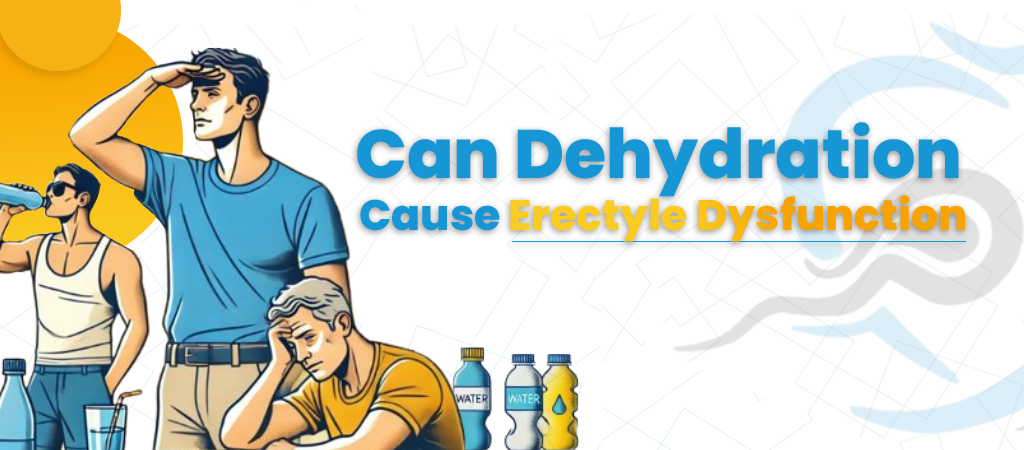Is Erectile Dysfunction Caused by Dehydration?
Indeed, erectile dysfunction can result from dehydration. Blood volume drops when the body is dehydrated, which makes it harder for the corpus cavern sum—the penis’s chambers—to get the oxygen and nutrient-rich blood it needs for an erection. Dehydration can also affect hormone levels, thicken the blood, and reduce blood pressure, all of which can affect erectile function.
A failing erection may be caused by a variety of physical and psychological factors. But we frequently overlook how dehydration contributes to sexual issues.
The etiology of dehydration in erectile dysfunction and the ways that dehydration might impair sexual health will be discussed in this blog.
Recognizing the Connection between Erectile Dysfunction and Dehydration
The inability to obtain or sustain the erection necessary for fulfilling sexual activity is known as erectile dysfunction. Numerous factors, such as lifestyle choices, psychological disorders, and physical health difficulties, can contribute to eating disorders.
Determining the physiological mechanisms underlying erection is a prerequisite to comprehending the potential role of dehydration.
The brain communicates with the penis’s nerves to relax the muscles and let blood flow when a man feels sexually stimulated.
An erection results from this blood flow filling the chambers inside the penis. The hormonal, neurological, and circulatory systems must all function properly for erections to occur.
The neurological and cardiovascular systems must operate at their best for this procedure to be successful, and sufficient blood flow is necessary.
It’s no secret that water is essential to practically every bodily function. It facilitates digestion, facilitates the movement of nutrients, helps control body temperature, and is necessary for preserving homeostasis.
Hydration is also essential for cardiovascular health because it allows the body to maintain blood volume and circulation.
Any type of dehydration causes a number of physiological alterations in the body that may affect erectile function.
What Impact Does Dehydration Have on Sexual Health?
A number of bodily changes brought on by dehydration may eventually result in unsuccessful erections.
This is how it takes place:
1. Diminished Volume of Blood
Because there is less water available when dehydrated, the body’s overall blood volume falls. Since an erection is known to be highly dependent on increased blood flow to the penile tissues, a decrease in blood volume may have an adverse effect.
The body will prioritize delivering blood to vital organs like the heart and brain over the penis when there is less water available, which could affect erections.
2. Greater Blood Thickness
when the body is dehydrated, the blood thickens. Because it is more difficult to pump more viscous blood, the heart must work harder and may become less efficient.
As a result, inadequate blood flow can affect the quality of an erection and make it challenging to sustain one.
3. Reduce Blood Pressure
A decrease in blood pressure brought on by dehydration may also lessen blood flow to the penis. Because there is less pressure to force blood into the penile tissues, lower blood pressure might make it harder to get an erection.
4. An imbalance of hormones
The synthesis and control of hormones also depend on water. Hormonal imbalances brought on by dehydration might affect testosterone levels, which are vital for sexual wellness.
Because low testosterone inhibits the physiological processes necessary for an erection and reduces libido, it can consequently contribute to ED.
5. The Effects of Dehydration on the Mind
Dehydration can affect mental health, which is also essential for healthy sexual performance, in addition to its physical impacts.
Fatigue, irritation, anxiety, and despair are all consequences of dehydration that can impair sexual desire and performance.
Adequate hydration is undoubtedly necessary for the brain to operate at its best, and even slight dehydration can have negative impacts on mood and cognitive function, both of which can exacerbate eating disorders.
How Can Dehydration Be Avoided?
It’s critical to understand that maintaining a healthy lifestyle requires drinking enough water.
The following advice will help you maintain adequate hydration and promote sexual health:
Drink A Lot of Water: Aim for eight to ten glasses of water each day. A person’s age, degree of exercise, and environment can all affect how much water they actually need.
Keep an eye on the color of your urine: To determine your level of hydration, monitor the color of your urine.
Always keep in mind that dark yellow urine indicates obvious dehydration, whereas pale yellow urine indicates enough hydration. In order to prevent dehydration, drink a lot of water if you observe black urine.
Limit alcohol and caffeine: Because of their diuretic effects, alcohol and caffeine can both cause dehydration. You can attempt to reduce their intake and instead counterbalance them with more water.
Consume foods that are hydrating: To help you stay hydrated generally, choose fruits and vegetables with a high water content. Eat items that will help you stay properly hydrated, such as watermelon, oranges, strawberries, and cucumbers.
Listen to Yourself: Be mindful of your body’s demands, as thirst is an obvious indication that you need more water. Make an effort to stay hydrated throughout the day, particularly before, during, and after strenuous exercise.

